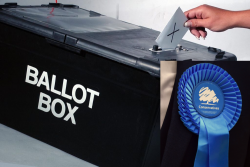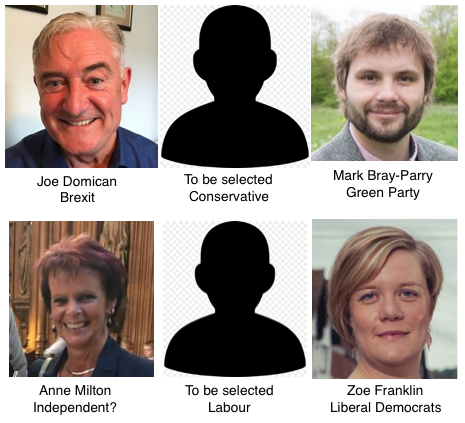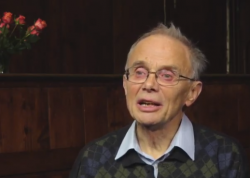 Abraham Lincoln
If given the truth, the people can be depended upon to meet any national crisis...
Abraham Lincoln
If given the truth, the people can be depended upon to meet any national crisis...
 Guildford news...
for Guildford people, brought to you by Guildford reporters - Guildford's own news service
Guildford news...
for Guildford people, brought to you by Guildford reporters - Guildford's own news service
Comment: How Remain-Backing Guildford Elected a Leave Tory, Part Two
Published on: 17 Dec, 2019
Updated on: 19 Dec, 2019
See also: Comment: How Remain-Backing Guildford Elected a Leave Tory, Part One
The winding road to yet another General Election.
 By Martin Giles
By Martin Giles
We should go back to July 23, this year, when Boris Johnson’s party elected him as the Conservative leader and he became Prime Minister. Guildford’s then-Conservative anti-no deal MP Anne Milton was no fan of Johnson as a person, nor of his Brexit policy. She had not voted for him and it appeared she jumped before she was pushed when she quit as a minister, after his success became obvious.
Move forward to September when the prospect of a general election was still uncertain. The first decision critical to the election result here in Guildford was made by Ms Milton when she rebelled against the Conservative Party whip and voted against a no-deal Brexit.
Her course was set amid the non-stop storm of Westminster politics and she refused to tack when, having voted for the Johnson deal, she voted against the government’s motion for an accelerated timetable for the new Withdrawal Bill’s passage. Many MPs, and potential voters, felt such a rushed schedule would not allow proper scrutiny.
Ms Milton’s decision gained respect for her integrity but she had burnt her boat; there would be no return to Conservative shores.

The minority government could not govern so a general election became a constitutional necessity. But the Fixed-Term Parliament Act prevented Johnson from being able to call it. Opposition MPs were delighted to hold him hostage. Whether most of the country shared their delight was another question.
But Remainers hoped by keeping the government under their thumb, unable to act and unable to call an election, a second referendum would be the only way out.

Anne Milton on the day that Parliament had been ordered by the Supreme Court to reconvene.
The Prime Minister’s unwise decision, found to be illegal, to force the issue by proroguing Parliament for a month failed. For a Prime Minister, that was demeaning, although you would not have known it given his upbeat and controversial performance in the debate on the day Parliament restarted by order of the Supreme Court.
Ms Milton had become deeply involved in cross-party talks to form a national government made up of most of the opposition members to wrest control from Johnson but agreement between the different parties could not be reached. A deal-breaker was Jeremy Corbyn wanting to be prime minister.
Then the Lib Dems blinked. They thought their time had come and they could make a major advance in a general election. Understandable perhaps, but a totally wrong judgement if a second referendum was the goal.
The General Election was set for December 12, an unusual winter one. Some forecast dire effects on turnout, especially if bad weather played a part.
But it was not a low turnout the Westminster opposition MPs should have feared. They had had not sensed a chill shift in the wind governing a significant section of public opinion.
Brexit-weary, even some Remainers recognised the continued foot-dragging of an unwilling Parliament was unacceptable. The delay itself was becoming the problem, costing money and a loss of confidence in our country from outside and within. Many said Britain was becoming a laughing stock.
Although large numbers were sticking to their Remain guns, a critical mass felt we did have to get on with it and for them the “Get Brexit Done” message would hit home, even if it was simplistic.
Boris Johnson told Ms Milton that if the Tories had to lose Guildford, so be it. That shocked her, and some of the other Tory rebels present. Her bluff had been called and her opinion of Boris Johnson sealed.
Ms Milton, a 14-year Westminster veteran, former minister, former deputy chief whip, now faced a difficult decision. Should she, could she, swallow her pride and try to get back into the party? Should she call it a day or should she stand as an Independent?

The main Parliamentary candidates for Guildford before the Conservatives and Guildford Labour made their selection and Anne Milton had confirmed her decision to stand.
She did not rush her decision and the chairman of the Guildford Conservative Association, responsible for overseeing selection of a replacement candidate, ignored complaints from some members and hung on till the last minute, hoping against hope that his friend would be readmitted. But it was too late.
A rather rushed selection process was triggered. Tory Central Office stepped in with a shortlist of three. That raised eyebrows and temperatures. None of them was high-profile. One even admitted he was not on the approved candidate list, and the selection meeting commenced with angry condemnation of the short-list imposition.
But within a couple of hours the choice was made, Angela Richardson, a Leaver, became the members’ darling and recriminations were forgotten, or swept under the carpet.
Labour, too, had to find a candidate but that seemed far more straightforward. Howard Smith, who had done well in 2017, did not wish to stand again and the choice was made of likeable Anne Rouse, a straight-talking, kind, matter-of-fact prospect.
For the Lib Dems, Zoe Franklin, an impressive former Guildford borough councillor, was well-positioned. She had had plenty of time to prepare, having been confirmed as the Lib Dem parliamentary candidate months before.

John Morris of the Peace Party decided to join in one more election campaign.
The Brexit Party selected candidate Joe Domican but there were doubts from the outset about whether he would be allowed to stand and risk splitting the Leave vote.
And Mark Bray-Parry intended to stand again for the Green Party, with veteran campaigner John Morris for the Peace Party. Seven candidates and the campaign was about to commence.
See also the concluding Part Three, how the election campaign unfolded in Guildford: Six Days in November.3
Recent Articles
- ‘Major Breaches’ Alleged In GBC Home Improvement Project
- A Disappointing Defeat for City Against In-form Alton
- University of Surrey Students Against Proposed Rules for Public Spaces
- Charity Pancake Race – Fun for All and £580 Raised
- Letter: Who Can We Expect to Stand as Mayor of Surrey?
- Building Heroes Partners with Velocity Roads to Support Veterans’ Transition to Civilian Careers
- Two Further M25 Junction 10 Closures Announced for March
- Mulligans Crazy Golf and Games Venue Coming to Guildford This Summer
- Broke Woking Council Changes Car Park Fees to Get More Revenue
- Notice: Figure It Out with Multiply


Search in Site
Media Gallery
Dragon Interview: Local Artist Leaves Her Mark At One of England’s Most Historic Buildings
January 21, 2023 / No Comment / Read MoreDragon Interview: Lib Dem Planning Chair: ‘Current Policy Doesn’t Work for Local People’
January 19, 2023 / No Comment / Read MoreA3 Tunnel in Guildford ‘Necessary’ for New Homes, Says Guildford’s MP
January 10, 2023 / No Comment / Read More‘Madness’ for London Road Scheme to Go Ahead Against ‘Huge Opposition’, Says SCC Leader
January 6, 2023 / No Comment / Read MoreCouncillor’s Son Starts Campaign for More Consultation on North Street Plan
December 30, 2022 / No Comment / Read MoreCounty Council Climbs Down Over London Road Works – Further ‘Engagement’ Period Announced
December 14, 2022 / No Comment / Read MoreDragon Interview: GBC Reaction to the Government’s Expected Decision to Relax Housing Targets
December 7, 2022 / No Comment / Read MoreHow Can Our Town Centre Businesses Recover? Watch the Shop Front Debate
May 18, 2020 / No Comment / Read More














Recent Comments